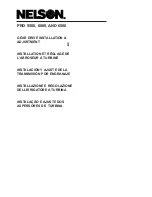
THIS PRODUCT IS MANUFACTURED AND CONTROLLED UNDER A QUALITY MANAGEMENT SYSTEM CERTIFIED TO ISO 13485 MEDICAL DEVICE STANDARDS.
FOR RESEARCH USE ONLY. NOT INTENDED FOR HUMAN OR ANIMAL DIAGNOSTIC OR THERAPEUTIC USES.
TOLL FREE PHONE
1 800 667 0322
y
PHONE
+1 604 877 0713
VERSION 2.4.0
y
y
FOR GLOBAL CONTACT DETAILS VISIT WWW.STEMCELL.COM
DOCUMENT #28940
22
4
COMMUNICATIONS AND FILE TRANSFER
Since RoboSep™ runs on Windows XP, it offers many possibilities for communication with other computers. RoboSep™ comes
configured for communication directly with another computer via crossover cable (supplied); RoboSep™ can easily be configured to be
connected to your network as well.
4.1
SET-UP FOR NETWORK CONNECTION
When a STEMCELL representative installs your instrument, RoboSep™ can be set up to automatically obtain an IP address from the
local network. This will allow access to shared folders on RoboSep™ from any other computer on the network. If needed, consult the
local network administrator to verify that this is allowed and that the correct permissions are available.
4.2
LOCATING AND CONNECTING TO ROBOSEP™ ON THE NETWORK
Whether RoboSep™ is connected to a network or directly to another computer, it must be located before its shared folders can be
accessed by other machines. If using Windows XP, follow these steps to locate the device and view RoboSep™ folders remotely:
1. Select “Search” from the Start Menu.
2. Select “Printers, computers, or people” then select “Computer on network.”
3. Enter RoboSep™ name Robo-XXXX where XXXX is the instrument serial number listed on the side of the instrument or
in the “About” tab of the user interface.
4. Double click on the Robo-XXXX icon. You should now see the shared folders on RoboSep™. The shared folders are
Protocols, Reports, and Logs.
5. Click on the desired folder and log on as “guest” when prompted.
For instructions on how to mount remote folders in other operating systems, contact the local network administrator.
4.3
ADDING PROTOCOLS REMOTELY
RoboSep™ comes with pre-installed protocols that have been optimized for cell separation from normal samples using supported
EasySep™ products. Protocols that have been created for other applications using the protocol editor (see Section 3) can be copied
into the Protocols folder on RoboSep™. To do this, navigate to the RoboSep™ folders on the network (as shown in the previous
section) and then perform the following:
1. Copy the RoboSep™ protocol(s) from the source computer onto RoboSep™ by either “copying and pasting” or by simply
“dragging and dropping” the protocol file into the Protocol Folder.
Note: The file being copied must have a unique name to avoid potentially overwriting existing protocols. Also, to secure
the protocol against accidental modification, change the file properties to “read-only”.
2. Once the desired protocols have been transferred to RoboSep™, update the protocol database list(s) as described in
Section 3.1.1.
3. Verify that the protocol behaves as expected with at least one dry run.
Protocols that are no longer required can be removed from the protocol folder and stored in an “Archive” sub-folder on RoboSep™ or
on any other networked computer.
4.4
ACCESSING REPORTS AND LOG FILES REMOTELY
For complete information regarding RoboSep™ usage reports and log files, including file structure and naming conventions, please
refer to Section 2.4 on page 13. To access these files remotely, locate RoboSep™ on the local network (as described in Section 4.2);
the Reports and Logs are found under the appropriately-named folders.
4.5
TRANSFERRING PROTOCOLS VIA USB KEY
1. Insert your USB key into the USB port on your PC. Your PC will detect the USB key as a drive/storage device.
2. Transfer RoboSep™ protocol(s) to or from the USB key by “copying and pasting” or by simply “dragging and dropping”.
Remove the USB key from the USB port when the transfer is complete.
3. Insert the USB key into the USB port on RoboSep™. Repeat step 2.
Summary of Contents for RoboSep 20000
Page 1: ...RoboSep The Fully Automated Cell Separator T E C H N I C A L M A N U A L V E R S I O N 2 4 0 ...
Page 33: ......
Page 34: ......
Page 35: ......










































